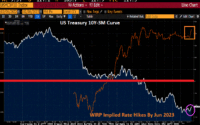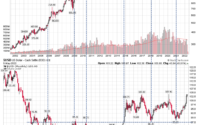ECB Doubles Rate to Most in Over a Decade Despite Recession Fear
(Bloomberg) — The European Central Bank doubled its key interest rate to the highest level in more than a decade and signaled it’s making progress in its battle with record inflation, just as the likelihood of a recession mounts.
Most Read from Bloomberg
Officials in Frankfurt delivered a second straight three-quarter-point hike on Thursday — as economists expected — while dropping a prior reference to increases continuing for “several meetings,” saying simply they expect borrowing costs to be raised “further.”
Citing “substantial progress in withdrawing monetary policy accommodation,” the ECB brought the deposit rate, which was below zero as recently as July, to 1.5%. “Inflation remains far too high and will stay above the target for an extended period,” it said in a statement.
Money markets pared tightening wagers by as much as 20 basis points, pricing the deposit rate to peak below 2.75% next year. That compares with a peak above 3.25% as recently as last week. The euro extended a slide.
In plowing on with increases even as energy-market turmoil batters the 19-nation euro-zone economy, the ECB reaffirmed its commitment to wrest back control over prices that are surging at five times the 2% target.
“Economic activity in the euro area is likely to have slowed significantly in the third quarter,” President Christine Lagarde told a news conference, describing a “higher likelihood of a recession.”
Asked about the change in wording in the ECB’s rate outlook, Lagarde said the exact path will be determined each time officials convene.
“It might well be several meetings,” she said. “We still have ground to cover.”
Thursday’s move matches the recent pace of the Federal Reserve, whose assault on inflation began earlier, and has boosted the dollar at the euro’s expense. Canada, however, wrong-footed investors on Wednesday by unexpectedly slowing the speed of its monetary tightening as its economy flirts with a downturn.
“The ECB is on a tightening mode which I think is going to crush the economy,” Erik Nielsen, global chief economist at UniCredit Bank, told Bloomberg TV. “The economy is already weak and we’re tightening policy over a string of things.”
Officials also toughened the terms on more than €2 trillion ($2 trillion) of ultra-cheap pandemic-era loans to banks known as TLTROs. The agreements had become problematic after the recent rapid rate hikes allowed lenders to park TLTRO cash in ECB accounts and earn a risk-free income.
Changing the conditions retroactively carries legal risks and could make banks wary of similar offers in the future, undermining their effectiveness. Deutsche Bank Chief Financial Officer James von Moltke said Wednesday he’d be “disappointed” if the terms were adjusted as banks signed up “faithfully” to keep credit flowing.
Officials also cut the interest they pay on the reserves banks are required to hold at the ECB to match the deposit rate.
With Lagarde and her colleagues moving in increments that appeared almost inconceivable earlier this year, the focus is shifting to how high borrowing costs can be lifted as households grapple with surging heating and mortgage bills.
Some officials have publicly indicated that Thursday’s move might not be the last of that magnitude. Analysts polled by Bloomberg see the deposit rate peaking at 2.5% in March, though they expect the pace of hikes to ease after this month.
Determining the appropriate dose of monetary tightening will be tough. While natural gas prices, which shot up after Russia invaded Ukraine, have fallen more than two-thirds since the summer, officials fret that inflation is broadening across goods and services and could spur expectations for further gains.
What’s more, politicians are starting to push back against rapidly rising borrowing costs as their economies buckle under the weight of the energy crisis. Italy’s new prime minister, Giorgia Meloni, used her first speech to parliament to criticize rate increases, while French President Emmanuel Macron has also grumbled.
Risks to the growth outlook are “clearly” on the downside, according to Lagarde, who described higher loan costs for consumers and businesses, alongside dwindling confidence. The opposite is true of inflation, she said.
The ECB’s hikes will eventually be complemented by efforts to reverse bond-buying that formed part of the stimulus response to recent crises. A debate has begun on shrinking its €5 trillion ($5 trillion) in debt holdings — a process known as quantitative tightening — though concrete action isn’t expected until next year.
While QT wasn’t discussed at this week’s meeting, Lagarde said it will be on the agenda in the final gathering of the year. A start date won’t be announced then, however, according to people familiar with the matter.
“What we decided is that we would pursue that discussion and we would decide the key principles of the reduction of our APP monetary portfolio in December,” Lagarde said.
–With assistance from Alessandra Migliaccio, Greg Ritchie, Craig Stirling, Zoe Schneeweiss, Andrew Langley, Alexey Anishchuk, Wout Vergauwen, Angela Cullen, James Regan, Veronica Ek, Jasmina Kuzmanovic, Dara Doyle, Ben Sills, Bryce Baschuk, Guy Johnson, Alix Steel, Bastian Benrath, Harumi Ichikura, Kristian Siedenburg and James Hirai.
(Updates with QT in penultimate paragraph.)
Most Read from Bloomberg Businessweek
©2022 Bloomberg L.P.
[ad_2]
Source link


